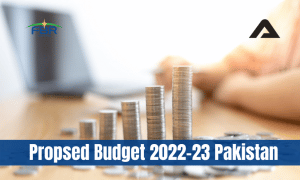On June 9, 2023, Pakistan’s much-awaited federal budget for the fiscal year 2023-2024 was released. This budget significantly impacts individuals, businesses, and the nation’s economy.
In this piece, we delve into the critical points of the budget, concentrating mainly on alterations to income and sales taxes, which are pivotal in moulding the financial environment.
Income Tax Pivotals
Cash Withdrawal Tax: Non-taxpayers face a 0.6% tax on cash withdrawals over Rs. 50,000 daily. This provision motivates individuals to become taxpayers and participate in the formal economy.
SME Expansion: The turnover threshold for Small and Medium Enterprises (SMEs) has significantly risen for manufacturers, from Rs. 250 million to Rs. 800 million. Moreover, the IT and IT-enabled services sector is now included in the SME category, stimulating growth and innovation.
Tax on Bonus Shares: The budget suggests a 10% tax on bonus shares for taxpayers and a higher 20% rate for non-taxpayers. This initiative aims to generate more revenue from capital gains resulting from bonus share distributions.
Exemption for Non-Resident Pakistanis: Non-resident Pakistanis purchasing immovable properties through Foreign Currency Value Accounts (FCVA) or NRP Rupee Value Accounts (NRVA) will be excused from advance tax. This provision aims to incentivize investment from overseas Pakistanis.
Withholding Tax on International Transactions: The withholding tax on international transactions made via debit/credit cards has been raised. For taxpayers, the rate climbs from 1% to 5%, and for non-taxpayers, it leaps from 2% to 10%. This provision intends to enhance revenue collection from cross-border transactions.
Elevated Tax Brackets for High-Income Earners: The budget unveils new tax brackets for those earning over Rs. 300 million, Rs. 400 million, Rs. 500 million, and more than Rs. 500 million. The associated tax rates for these brackets are 4%, 6%, 8%, and 10%, respectively. This modification aims to augment the progressive nature of the tax structure.
Tax Relief for IT Exporters: IT and IT-enabled services exporters are no longer required to file sales tax returns to benefit from the reduced tax rate under the final tax regime. This change eases the tax compliance process for IT exporters, encouraging growth in the sector.
Tax Credits for Property Construction: Individuals and builders engaging in property construction during 2024-2026 will reap the benefits of tax credits. For individuals constructing their own homes, the credit is limited to the lesser of 10% of tax liability or Rs. 1 million. Builders can benefit from a credit of 10% of tax liability or up to Rs. 5 million for new construction projects.
Increased Limit for Foreign Remittances: The budget heightens the limit for foreign remittances from Rs. 5 million to USD 100,000 annually. Remittances within this limit will not be subject to inquiries about their nature and source, easing the process for overseas Pakistanis.
Sales Tax Pivotals
Tax Exemption for IT-related Imports: Software exporters registered with the Pakistan Software Export Board can now import IT-related products tax-free. This incentive promotes the growth of the IT sector and boosts software exports.
Revocation of Criteria for Tier-1 Retailers: The budget cancels the criteria determining the status of “Tier-1 Retailers” who were obligated to integrate their Point of Sale systems with the Federal Board of Revenue (FBR). This alteration aids retailers with shop areas of 1000 sq. feet or 200 sq. feet (for furniture shops) and those engaged in the jewellery trade.
Exclusion of Electricity from Federal Tax Regime: Electric production, transmission, and distribution are no longer classified as “Goods” or “Supply” for federal tax purposes. This alteration aims to simplify the taxation process for the energy sector.
Revocation of Sales Tax Exemption for Bulk Edible Product Sales: The sales tax exemption on the bulk sale of branded edible goods, including milk, yoghurt, and red chillies, is proposed to be revoked. This provision aims to increase revenue from the sale of these items. The new budget also underscores the importance of tax filing for individuals, introducing clear benefits for those who proactively meet their tax obligations.
Reduced Sales Tax Rate for Medicine: The sales tax rate on substances registered as drugs and medicines has been significantly cut from 18% to 1%. This alteration aims to make healthcare more affordable and accessible to the public.
Increased Sales Tax Rate for Textile and Leather: Tier-1 Retailers trading in leather and textile products will now encounter an elevated sales tax rate of 15%, up from the previous 12%. This measure aims to increase revenue collection from these sectors.
To facilitate this process, ATS Consultantx has created an innovative online platform, enabling individuals to become taxpayers and effectively submit their taxes easily and effortlessly. Our intuitive interface and streamlined procedures aim to simplify the tax filing experience, guaranteeing that individuals can comfortably navigate through the system’s complexities and swiftly fulfil their obligations while taking advantage of the benefits proposed by the 2023 budget.


